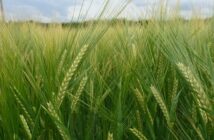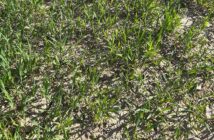The millionth tonne of grain to be exported through Gleadell’s deep-water port facility at Peel Ports Great Yarmouth was loaded this week, underlining the port’s role as a strategic outlet for grain grown on East Anglian farms.
The milestone comes six years after Gleadell invested £5m to develop its export business in the port. Since then cargoes of wheat, barley, oilseed rape and pulses have departed to destinations across Europe and North Africa.
Gleadell grain trader Paul Dowson, who is based at the company’s Swaffham office, said: “East Anglia is a major grain-producing region, but until the facility at Peel Ports Great Yarmouth opened the nearest deep water ports regularly in use for grain were Immingham and Tilbury.
“The development enables us to load load larger vessels from the region – Peel Ports Great Yarmouth is one of only seven or eight English ports capable of loading vessels over 13,000t in a grain surplus area.
“This has opened up a wider spread of markets, helping to ship the UK’s exportable surplus. The port also directly benefits the region’s farmers, as it reduces haulage distances from farm to a deep water port.”
Reaching the 1m tonne mark was a major achievement, Mr Dowson said. The facility, which includes a grain store, shiploader, offices, laboratory and weighbridges, had only seen three “normal” export years in the six years it has been open. Commissioning took place in 2010/11, and the UK had two problematic crop years in 2012/13 and 2013/14.
“This current season represents our biggest volume to date from Great Yarmouth, with over 250,000t having been exported,” he added.
In conjunction with new port owner Peel Ports, the grain export facility now offers ship-owners a fast, efficient and professional service and provides farmers with a deep-water port on their doorstep, Mr Dowson said.
“The value to farmers is demonstrated by the large growth in the tonnage committed to the facility via the Great Yarmouth Growers Club, which offers specific storage and market benefits to farmer members.”
The millionth tonne came from grower Matthew Baker of David Baker Farms, who farms land in Norfolk and Suffolk and is based at Boundary Farm, Ilketshall St Margaret, near Bungay. It will join a further 26,999t of feed wheat on the MV Resko, which is destined for Spain.
Mr Baker, who grows 1800ha of combinable crops, puts a significant tonnage of feed wheat, soft wheat and oilseed rape through Great Yarmouth every year using his own lorry when possible.
“We can’t store all our grain, so having this facility close by, and the associated storage, has been valuable to our business,” Mr Baker said.
“It’s on the doorstep for us, so we can move tonnes pretty quickly. It reduces our haulage costs and, more importantly, means we can get an extra load in per day.
“By growing soft Group 4 and Group 3 varieties that suit the export market, we hope to achieve a small premium as well.”
Peel Ports Great Yarmouth port director Richard Goffin said the new owner was committed to developing opportunities at the port, investing in existing and new opportunities for a sustainable future.
Mr Goffin said: “These record breaking tonnages from Gleadell highlight the strategic importance of Great Yarmouth in exporting grain grown from East Anglian farms.
“Gleadell was one of the first users of the Outer Harbour since its opening six years ago. It recognised the advantages of consolidating volume at the most easterly deep-water port in the UK capable of handling its vessels sizes.
“This strategic decision to partner with the Port of Great Yarmouth continues to play a significant part in contributing to the growth of the UK economy, the region of East Anglian and the local community.”
Great Yarmouth is already well established as a key port for handling vessels carrying bulk cargoes, such as grain, aggregates and fertilisers. The Norfolk port also supports the offshore wind power generation sector.
Recently Peel Ports Great Yarmouth was named as port of choice to handle construction and installation activities, for two major offshore wind farms – ScottishPower Renewables East Anglia ONE and Siemens Galloper wind farms.


